Peter MALONE
Saturday, 09 October 2021 13:01
Agatha Christie's Poirot Kidnapped Prime Minister
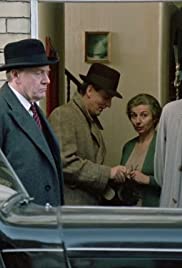
THE KIDNAPPED PRIME MINISTER
UK, 1990, 50 minutes, Colour.
David Suchet, Hugh Fraser, Philip Jackson, Pauline Moran, Lisa Harrower, David Horovitch, Ronald Hines, Patrick Godfrey, Jack Elliott.
Directed by Andrew Grieve.
This is a short story in the 70-episode television series of Agatha Christie mysteries with David sachet as Poirot.
It is a very British story, the importance of the British Prime Minister in League of Nations discussions about the rearmament of Germany. There is an attempt on the Prime Minister’s life, then his kidnapping. The government is upset and Chief Inspector Chap recommends Poirot to solve the case. The government officials appreciate it, highlighting that Poirot has only 32 hours to find the Prime Minister. The story is that he was abducted in France. Poirot decides that he is still in England and pursues that line.
However, the officials are very impatient, not allowing Poirot time to use his grey cells, to think. Hastings is helping with the investigation and Chief Inspector Chap is also present, having recommended Poirot but feeling that he will lose his pension if Poirot does not succeed.
Poirot goes to the place of the initial accident, searches at the hospital where the Prime Minister was treated, goes home to bed for a sleep and then visits the flat rented by the car driver, season Irish connection, interviews commander Daniels who is in charge of getting the Prime Minister to Paris, about his highly publicised divorce proceedings, goes to visit the commander’s wife and gets Hastings to follow her as she drives into the country. Miss Lemon then is able to provide some information about Mrs Daniels’ home.
There is a confrontation at the house, the police arriving, Poirot and Hastings present, Mrs Daniels and the driver inside, her going to the roof and shooting herself, the emergence of the Prime Minister.
1. The popularity of Agatha Christie mysteries? The television series? David Suchet as Poirot?
2. A British story? The assassination attempt on the Prime Minister? His head being bound? The officials waiting at the railway station? His eventual arrival? Daniels and his care for the Prime Minister? The Prime Minister and the importance of going to League of Nations discussions, in Paris, for Germany and its rearmament?
3. Poirot, in his office, Hastings and Miss Lemon? The phone call, the official, Poirot going to the government offices, his being briefed, the disappearance of the Prime Minister, in France on his way to Paris? Poirot having 32 hours to solve the case? Accompanied by Hastings? The presence of Scotland Yard and this case being important for Chief Inspector Japp? His participation in the search?
4. The officials, wanting action, impatient with Poirot, not understanding what he was doing? Japp and his defence of Poirot? Yet his concern about losing his pension?
5. Poirot, going to the scene of the initial crash, the barrier on the road, the list of hospitals, checking with the Prime Minister was taken? The visit to Daniels, his office, his being wounded in France, his return to London? Poirot on the phone, the framed photo on the desk and its later significance?
6. Poirot, going home to sleep, the grey cells? The impatience of the officials?
7. The newspaper reports about Daniels and his wife, the marriage breakup, the headlines? The disappearance of the car driver? Going to his apartment, the Irish landlady? The Irish connection?
8. The investigation into Daniels, his wife, her being part of Irish aristocracy, Daniels and his father’s past political clash?
9. Miss Lemon and, the home of Mrs Daniels, Poirot and his interview with her, her hostility towards her husband? Hastings following her to the country, losing her, Poirot waiting for the phone call, Japp calling the police? The identification of her home?
10. The police, Poirot arriving, inside the house, Mrs Daniels and the driver, her husband arriving and wanting to get through, her taking the gun, on the roof, shooting herself? The taking of the driver? The Prime Minister released? An Irish anti-British conspiracy?
11. Poirot and the joke about his new suit, the tailor, the measurements?
Published in Movie Reviews
Published in
Movie Reviews
Saturday, 09 October 2021 13:01
Agatha Christie's Adventure of the Cheap Flat
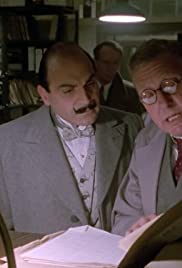
THE ADVENTURE OF THE CHEAP FLAT
UK, 1990, 50 minutes, Colour.
David Suchet, Hugh Fraser, Philip Jackson, Pauline Moran, Samantha Bond, John Michie, Jemma Churchill, Peter Howell, Jennifer Landor, Ian Price, William Hootkins, Anthony Pedley.
Directed by Richard Spence.
While this is a London story and the cheap flat is not cheap but inexpensive, is also a film about military espionage, the Mafia, assassins and an FBI agent, extremely bunches (William Hootkins) coming to London, taking over chief Inspector Japp’s office, considering Poirot just as a gumshoe and not having a high opinion of them.
There is initial suspicion on a young couple who get the cheap flat while others have been rejected. However, Poirot with some research and nightclub interviews by Miss Lemon, Hastings inevitably helping but misunderstanding, the culprit who has not only stolen important plans but has killed someone, is tracked down to a London nightclub, the American assassin following, the FBI having a stakeout. The case is solved by Poirot, who has gone initially to the movies to see G-Men? with Hastings and chap who enjoy it immensely, with Poirot did testing the violence.
1. The popularity of Agatha Christie mysteries? The television series, 70 episodes, the short story? David Suchet as Poirot?
2. The London setting, Poirot at home and at work, Hastings accompanying him and theorising, helping out in crises? Miss Lemon, at home, her posing as the journalist?
3. A London story, the young Robinson couple, the woman refused the flat, the Robinsons accepted? Their being set up, target for the American Mafia?
4. The atmosphere with the gangster films, the FBI, the excerpt from The G Men, Japp and Hastings enjoying it and the excitement, Poirot closing his eyes? His reaction to guns in the street? American law?
5. The irony of the FBI agent, dominating, obnoxious, putting down Japp, calling Poirot a gumshoe? Taking over the office, the stakeout? His being one-upped? His acknowledgement at the end?
6. Poirot, investigating the mystery, the story of the stealing of the documents, the Mafia (and the FBI denial of organised crime in the US)? The singer, her background, in the United States, seducing the official, shooting him? Betraying the Mafia? Her fleeing to England? The Mafia sending a killer after her? Her setting up the Robinsons, her name being Robinson, targets?
7. Hastings and Poirot, meeting the Robinsons, their story, Poirot curious, examining documents? Inspecting the apartment, taking it, the exit for the bins, access to the Robinsons? His using it while they were at home? Examining the setup? Suspicions on them at first?
8. Miss Lemon at the nightclub, the interview? Identifying the singer as the killer? Poirot and his visit, the awkwardness of the manager?
9. The visit, the performance, the singer and her henchmen, the confrontation in the dressing room? The FBI and surveillance? The killer keeping vigil at the apartment?
10. The confrontation, the gun, the irony of Poirot removing the bullets, the arrest? Poirot solving the mystery, and achieving everything without having had recourse to gunfire?
11. Poirot being measured for his suit, the tailor, increased measurements, the humour?
Published in Movie Reviews
Published in
Movie Reviews
Saturday, 09 October 2021 13:01
Agatha Christie's Poitot Adventure of the Egyptian Tomb
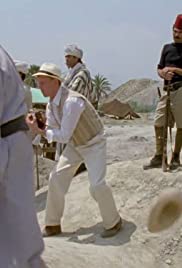
THE ADVENTURE OF THE EGYPTIAN TOMB
UK, 1993, 50 minutes, Colour.
David Suchet, Hugh Fraser, Pauline Moran, Rolf Saxon, Olivier Pierre, Jon Strickland, Bill Bailey, Paul Birchard, Simon Cowell- Parker, Grant Thatcher, Anna Cropper, Peter Reeves.
Directed by Peter Barber Fleming.
This is a later episode in the short stories section of the television series of Agatha Christie’s Poirot, with David Suchet as Poirot.
Agatha Christie had a connection with excavations, with her husband, and such stories as Murder in Mesopotamia. The location for these Egyptian locations in the Valley of the Kings is actually Spain.
The film draws on the popularity of the excavations by the British and the Americans in Egypt’s, the opening up of tombs and the revelations, and mysterious deaths and the popularity of imagining curses.
There are several deaths and the widow of the chief excavator asks Poirot to investigate. He and Hastings go to Egypt. There is a mysteries of several deaths at the excavations site. There is also the suicide of a young man in New York. Poirot and Hastings go to Egypt, there are more deaths – but Poirot gathering the group together, unmasking the killer and explaining his motivations (which do seem to be a bit far-fetched even though the killer himself is comparatively nondescriptive compared with other villains in Agatha Christie mysteries.
1. Polarity of Agatha Christie mysteries? The television series with David Suchet as Poirot?
2. The London settings, the block of flats, Poirot’s office? The visit to the Woolard estate?
3. The contrast with the sequences in Egypt, the excavations, the archaeologists and the workers, the opening of the tomb, the interior of the tomb? The camp, the details of life at the digs, Poirot, Hastings in the tent? The visit to the United States? The young man, his apartment, his death? The musical score?
4. The opening of the tomb, Sir Jon and his impatience, imperious in manner, his collapse? The continued focus on the statutory? The possibilities of a curse? His wife, consulting Poirot, the hostility of Guy?
5. Hastings in America, the visit to Rupert, his gloved hands, upset? Hastings return, finding Rupert dead? The suicide in the note?
6. The further deaths at the digs, tetanus, infections, harsh deaths? Dr Ames and his having to treat all those who are sick? His background, the group of young men being at Yale?
7. Poirot and Hastings, going to Egypt, the tent, accommodation? The investigations? The deaths? Ames and his illness? The warning from the servant? Guy and his presence, apprehensive, in charge of the excavations? Poirot and the suggestions about the curse?
8. Poirot, his investigations, the cabinet, the medications? Poirot, the drink, his collapse, only pretence?
9. The gathering of the group, the British archaeologists, the American archaeologists, Poirot and his explanation? The revelation that the doctor was the murderer, the gun, his being overpowered? The explanation of his motivation, the death of the uncle and his leaving his money to his nephew, persuading Rupert that he had leprosy, the depression leading to suicide, and Rupert grateful for the doctor saving his life in the past, naming him in his will?
Published in Movie Reviews
Published in
Movie Reviews
Saturday, 09 October 2021 13:01
Unfriended: Dark Web
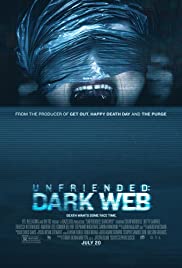
UNFRIENDED: DARK WEB
US, 2018, 93 minutes, Colour.
Colin Woodell, Stephanie Noguera, Betty Gabriel, Rebecca Rittenhouse, Andrew Lees, Conor del Rio.
Directed by Stephen Susco.
This is a sequel to Unfriended, which was quite a popular horror film, focusing on computers and the twentysomethings who spend their time looking at computer screens – but with a touch of the supernatural.
Audiences responded well to the original film but even better to this sequel. The supernatural elements have been eliminated. Rather, a group of twentysomethings spend their time at the computers, the camera focused on the computer and all the action taking place on the computer screen, all the familiar details, icons, page layouts… As well as chat rooms and divided screens.
The young man finds a computer and takes it home, connecting with his friends. He is also in love with a young woman, hearing impaired, communicating with her by computer. However, as the title would indicate, there are sinister aspects of what is on the found computer, echoes of the original owner, significant characters who do more than threaten. The group is tempted to experiment in Bitcoin deals which leads them further into debt and to mystery.
This is one of those “Enter the Void� films – dire consequences for each of the characters, no redemption, no hope.
1. The impact of the original, Unfriended? The device of twentysomethings and their computers? The introduction of the supernatural? This sequel, better received, the elimination of the supernatural elements, the focus on manipulation of the dark web?
2. The focus on the screen, the fixed camera, the action taking place on the screen, multi-images, the range of the participants, the mysterious other characters? And the constant focus on the screen and the various changes, the cursor, options…?
3. Audiences identifying with watching the computer screen, the familiarity with the various options and styles, chat, communication? Alarm at the interruptions, disruptions, dangers?
4. The 20-something characters, the men, the women? Matias and his finding the computer, using it, communication, his relationship with Amaya, her hearing impediment, sign language? The interchanges, the relationship? The friends, AJ and his cavalier attitudes, Damon and his controls, Nari and Serena and the relationship, Lexx and her participation, her disappearance?
5. The background story of the stolen computer, Erica and her loss, the photos of her and her family? Charon and mysterious presence, hooded, the attack on Kelly, the threats to Amaya? Matias saying it was a game, covering the reality, spied on, the hooded figure and the manipulation of his face?
6. The world of the dark web, the participants, the introduction of money, Bitcoin, the deals, the risks, wanting the computer back? The threats to go to the police? Matias restraining people?
7. Amaya, on the subway, the threats?
8. Vengeance, AJ and his going upstairs, being shot? Damon, the confession note, his being hanged? The two young women, the visualising of their story, their deaths? Nari on the platform? Amaya, Matias coming to the rescue, the vote about his living or dying, the hit run truck?
9. The pessimism of the narrative? No escape? As a warning about the dark web?
Published in Movie Reviews
Published in
Movie Reviews
Saturday, 09 October 2021 13:01
After Truth: Disinformation and the Cost of Fake News
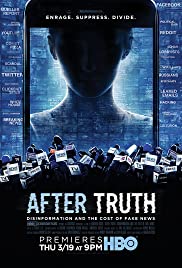
AFTER TRUTH: DISINFORMATION AND THE COST OF FAKE NEWS
US, 2020, 95 minutes, Colour.
By Andrew Rossi.
This is a film about conspiracy theories, American conspiracy theories – which may seem very wild in the United States but seem even wilder to those outside the United States.
This documentary was released by Home Box Office in 2020, at the beginning of the election year and President Trump hoping for a second term. The thrust of the documentary is that the conspiracies portrayed in this film tend to be perpetrated and believed in by Trump supporters. Some of them have been used to bolster support for him. There are a number of sequences from the 2016 Trump rallies, the denunciation of Fake News, urging the crowds to turn to the press boxes and shout at them.
In 95 minutes, not all conspiracies can be considered so there is a selection here. The point is made that a conspiracy is not just investigating an event and having opinions but rather holding that the opinions are the truth.
This is particularly the case in a conspiracy that was heard of outside the United States but was particularly American. In order to target Hillary Clinton in her presidential campaign, this conspiracy theory focused on a family pizza establishment in Washington DC, where families could gather, have recreation, especially with ping-pong tables, and enjoy their pizza. The conspiracy concerned the proprietor of the pizza establishment: Comet, James Alefantis speak emotionally to camera. The venue was frequented by politicians and the media. Stories were told that the pizza establishment was a cover for a paedophile ring, organised by the manager and by Hillary Clinton herself, that the menu items were codes for choosing boys or girls for sexual activity, that the basement of the establishment was where the abuse took place. This conspiracy received a great deal of coverage, detrimental to Hillary Clinton. The film shows the journey of a conspiracy theorist from South Carolina, so incensed that he rode his bike to Washington DC, brandished a gun, threatening the staff and patrons. Quick thinking on the part of the staff meant that the police arrived quickly and overpowered him, no injuries to customers.
There are talking head interviews with quite a number of journalists, a focus on to right-wing conspiracy fabricators, Jack Bergman and Jacob Wohl, scenes of their planning their work, press conferences with innuendo rather than facts – and being challenged by the journalists present.
Indications are given on various extreme websites and information on those sites. Perhaps best known outside Australia is the broadcaster, Alex Jones, who said that the murder of the school children at Sandy Hook was a hoax. There are quite a number of excerpts focusing on him, information given that he is Internet presence was closed down, his going to Washington, enraged, confronting journalists and denouncing them.
The tone of the film is set from the beginning with a conspiracy about military exercises in Texas in 2016, locals up in arms, the theory that Barack Obama was preparing prisons for his opponents. There is a scene with a local meeting, the military Had explaining what was happening and the locals telling him that they didn’t believe a word he said.
The film is helpful in presenting these conspiracies and their backgrounds, the personalities promoting, the experts critical of them. While the immediate response from some audiences was favourable, commending the expose, there was a great deal of hostility against the documentary from large numbers who believed that the film was all propaganda against American citizens who wanted to know the truth.
Published in Movie Reviews
Published in
Movie Reviews
Saturday, 09 October 2021 13:01
Agatha Christie's Poirot Cornish Mystery
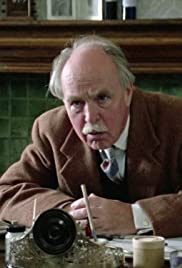
THE CORNISH MYSTERY
UK, 1990, 50 minutes, Colour.
David Suchet, Hugh Fraser, Philip Jackson, Pauline Moran, Chloe Salamon, John Bowler, Jerome Willis, Amanda Walker, Derek Benfield.
Directed by Edward Bennett.
This is a rather straightforward murder mystery, part of the popular television series of Agatha Christie mysteries with David Suchet as Poirot.
Once again, there is a consultation, Hastings present, a middle-aged woman saying that she was being poisoned by her husband. She returns to Cornwall, Poirot and Hastings travelling the next day only to find that she has died. Her husband, the local dentist, is the main one under suspicion, gossip about his relationship with his younger assistant, and the quick announcement of the engagement. Others involved are the dead woman’s niece who had clashed with her aunt and moved out, the niece and her fiance, a local shop owner. One of the most forceful characters in the film is the local doctor, defying Poirot who is greatly irritated at him, declaring that the woman had died of gastritis.
Poirot does some investigations, interviewing the niece and her fiance. He is convinced that the husband is innocent and decides to rescue him from the courts. For Chief Inspector Japp, it is an open and shut case. There are scenes in the court room – but, finally, Poirot confronting the fiance, exposing his motivation and behaviour, giving him 24 hours to escape, but then going to the court and the police.
There is a final scene of Poirot and Hastings leaving the town, Japp discovering what has happened, waving his fist at Poirot! (While the setting is Cornwall, commentators note that it was filmed in a very recognisable town, with Castle in the background, in Somerset.)
1. The popularity of Agatha Christie mysteries? The television series with David Suchet as Poirot?
2. Almost a paradigm of an Agatha Christie mystery and Poirot investigation: introduction, consultation, murder, suspects, complications, the arrest, court case, investigation, confrontation, solution?
3. Poirot in London, at home, Hastings and his meditation, Indian food, rice? Poirot’s taunts? Miss Lemon? The consultation? The rain? Walking in the park, Mrs Pengelly, from Cornwall, suspicions about her husband, being poisoned? The clash with her niece?
4. Poirot and Hastings travelling to Cornwall, the visit to the house, the news of Mrs Pengelly’s death? The visit to the doctor, hardheaded and stubborn, insisting on gastritis? The maid and her condemnation of Mr Pengelly? The gossip in the town? Mr Pengelly and his dental assistant?
5. Poirot and Hastings, investigations, Hastings response to the blonde, infatuation? Visiting the niece, her story, the clash with her aunt, her aunt’s infatuation with Frieda’s fiance? His presence, corroborating this, discussions with Poirot?
6. The arrest, the court case, the witnesses, Mr Pengelly in the box, Poirot wanting to rescue him?
7. Chief Inspector Japp, his presence, a closed case? Poirot and his taunts? The discussions – and the finale, Poirot and Hastings driving off? Japp waving his fist?
8. Suspicions: Mr Pengelly, the dental assistant, Freda, Jacob?
9. Jacob, his shop, prosperity, expansion, the hope for marriage?
10. The reading of the will, Freda getting £2000? Mr Pengelly £20,000? And Mr Pengelly announcing his engagement to his assistant?
11. The confrontation with Jacob, the truth about his plan, the money, the murder, creating the fiction about Mrs Pengelly? Poirot giving him 24 hours? The signing of the confession?
12. Taking it to the court, the interaction of the case, Mr Pengelly freed?
Published in Movie Reviews
Published in
Movie Reviews
Saturday, 09 October 2021 13:01
Love is Blind
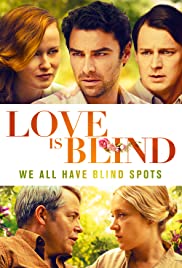
LOVE IS BLIND
US, 2019, 89 minutes, Colour.
Shannon Tarbet, Aidan Turner, Benjamin Walker, Matthew Broderick, Chloe Sevigny, Mark Blum.
By Monty Whitebloom, Andy Delaney.
Very mixed responses to this drama. For some, it is a beautifully written and acted story of interactions between three central characters. For others, it is weird, as is the behaviour of the characters, and, perhaps, psychologically implausible.
The central character is a young woman, Bess, played by British Shannon Tarbet. She is working in an optometrist shop, studying in part, the owner very sympathetic to her and hoping she will work in the shop. At home, she is devoted to her father who has Parkinson’s, and played sympathetically by Matthew Broderick. But, a key element is that she thinks her mother is dead, but she is not. She is in the house, but Bess does not see or hear her, despite her father’s reassuring her.
This is the beginning of the implausibility for some audiences.
In the town, Bess is friendly with a student of psychology, Farmer, played by Benjamin Walker. He explains that he is on the spectrum and this is very clear in his behaviour, manner of speaking, manner of relating and interacting with people. He is trying to help Bess.
The other central character, Russell, played by Irish Aidan Turner (Poldark and other television series) works in demolition but has a very low self-image (despite being rather dashing in appearance and manner) and is suicidal.
There are many unanticipated interactions between the three characters, at first Bess unable to see or sense the presence of Russell, Farmer urging her to speak aloud as if he was present, Russell following her and listening.
There are some emotional moments as the father suffers and infection after surgery, goes into a coma and dies – and the audience seeing his wife, played by Chloe Sevigny, dealing with the death and the funeral.
The narrative here does not reach any final conclusion, leaving the audience to wonder about the characters, possible changes in their lives, the possibility for Bess seeing Russell and falling in love.
Someone remarked, “romantic but weird�.
1. The title? As applied to Bess? Not seeing those she loved?
2. The locations, the Hudson Valley, New York State, the town, homes, hospitals, working sights? The musical score?
3. The plausibility of the plot? Bess and her trauma? Her relationship with her mother, her mother’s absence, the crash, best not seeing her? Later sensing her presence? Her not seeing Russell?
4. A story of three dysfunctional people? Their strange behaviour? Their interactions? Farmer trying to help others? His own situation?
5. The background of Bess’s father, love for her, at home, illness, love for his wife? The doctor, the diagnosis, his going into hospital, surgery, infection, death? Her mother? The relationship between the two? The flashbacks? Happy, sad, the accident? Her presence in the house? Her husband talking to her? Her response to being invisible in Bess’s sight? Attempts to relate to her? Getting ready for the funeral? The two of them at the graveside?
6. Bess, her age, optometrist studies, the owner of the store, support? Her relationship with Farmer, over the years, the therapy relationship friendship, touches of love? His therapy in getting her to talk aloud to Russell? The effect on her?
7. Russell, the demolition, his poor self-image, suicidal, the attempts? His work, the encounter with Farmer? The discussion about therapy? The meetings with Farmer, willing to collaborate with the therapy for Bess? The effect on him, following her, listening to her? Yet slitting his wrists?
8. Farmer, on the spectrum, his studies, interest in psychology, therapy, the relationship with Bess and the sessions with her? The encounter with Russell and the demolition? The
discussions, his helping him? His angry outburst? Reconciliation?
9. A portrait of three characters and the dysfunction? Interactions? The plausibility of the situations and conditions?
Published in Movie Reviews
Published in
Movie Reviews
Saturday, 09 October 2021 13:01
Agatha Christie's Poirot Veiled Lady
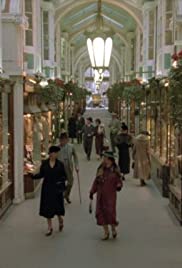
THE VEILED LADY
UK, 1990, 50 minutes, Colour.
David Suchet, Hugh Fraser, Philip Jackson, Pauline Moran, Frances Barber, Terrence Harvey.
Directed by Edward Bennett.
This is an early short story from the television series of Agatha Christie mysteries starring David Suchet as Poirot.
While there is a murder in this story, it is in the background. In the foreground is a jewel robbery, al ady being blackmailed, an expose.
The film opens in a London Arcade with a brazen jewel robbery. Poirot is not interested because he feels he is not being appreciated – and Hastings remarking that criminals in England are not afraid of him because they hadn’t heard of him! Poirot suggests he would have made an excellent criminal had he chosen to be.
The veiled lady comes to see him but he and Hastings meet her at a hotel. She is a very glamorous presence, played by Frances Barber, and explains that when young she had written a letter, which could be misinterpreted and a professional criminal now has it and is blackmailing her. Poirot responds gallantly and succumbs to the temptation of activity, pretending to be a tradesman at the blackmailer’s house (who would come to visit Poirot and defied him). There is a very imperious housekeeper who looks down her nose at Poirot. He works on the locks of the house, he and Hastings returning at night to find the mysterious letter, the housekeeper having stayed the night calls the police, Poirot is put in jail and is released with cognizance by Chief Inspector Japp. There is a comedy of seeing Poirot out of his dapper suit, riding a bicycle, wearing a beret, sitting in jail and Japp telling the police that he was known as Mad Dog.
Poirot finds the secret box with the letter, tries to return it to the lady, she wants the box – and the revelation that it contains the jewels from the robbery and that she and the blackmailer are actually professional criminals well-known to Japp. There is an elaborate chase in the Museum of Natural History.
An entertaining variation on the theme.
1. The popularity of the Agatha Christie mysteries, the television series with David Suchet as Poirot?
2. Hastings as Poirot’s associate, with an appreciative eye to the ladies, misinterpreting Poirot’s explanations, but aiding him in the housebreaking? Miss Lemon and her assistance, her research?
3. The title, the introduction of Lady Millicent, the veil, calling, the meeting at the hotel, her reticence, Hastings finding her attractive, her story of the indiscreet letter, the criminal blackmailing her, her impending marriage, not having the money to pay? Poirot and his willingness to help?
4. The background of the jokes about London criminals, Poirot’s vanity, that he could have been a good criminal had he chosen, Hastings remarking that the London criminals did not know who he was?
5. The visit from the blackmailer, his arrogance, refusing any compromise?
6. Poirot’s decision, to act like a criminal, his riding the bike, the blue coat, his beret? Pretending to be the tradesman, the housekeeper and her haughty attitude? His fixing the doors? He and Hastings returning at night, the search for the document, all through the house, finding the box? The landlady staying overnight, calling the police, Hastings bursting out the window, Poirot arrested? In jail, in the cell? His complaint to Hastings – but Hastings explaining his going to Chief Inspector Japp to get Poirot released? And Japp enjoying telling the police that
Poirot was feared as Mad Dog?
7. The meeting with Lady Millicent, the letter, the other compartment, the jewels? Her taking them? The pursuit through the Natural History Museum, the accomplice turning up, Japp knowing who they were, regular criminals, their hiding, Hastings finding them?
8. The background of the murder in Amsterdam but its not being part of this plot?
9. The criminals, the arrest, and Poirot having had his fling at criminal activity?
Published in Movie Reviews
Published in
Movie Reviews
Saturday, 09 October 2021 13:01
Little Monsters
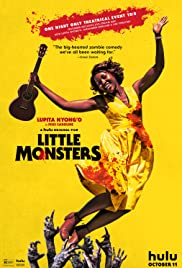
LITTLE MONSTERS
Australia, 2019, 93 minutes, Colour.
Lupita Nyong'o Alexander England, Josh Gad, Kat Stewart, Diesel La Torraca, Nadia Townsend, Marshall Napier.
Directed by Abe Forsythe.
Australian writer-director, Abe Forsythe, once made a parody of Ned Kelly, called Ned. Here he tries his hand at an Australian zombie film. It is a blend of the serious and the comic.
The main focus of the story is a group of young children and their teacher. The teacher, Miss Caroline, is played by American actress Lupita Nyong’o who won an Oscar for her performance as the slave in 12 Years a Slave, featured in the Star Wars series, in Black Panther and in Jordan Peele’s horror/comedy, Us.
The leading man is Alexander England, Dave, a lumbering scruffy type who will have to be redeemed, but looking like a cousin of Chris Hemsworth.
Audiences may be put off at the beginning by the focus on Dave and his rather raucous clash with his girlfriend and then discovering her having an affair. Crushed, Dave takes refuge with his sister and bonds with her young nephew. He takes him to school where he meets Miss Caroline.
Some presume him to be a teacher so he accompanies Miss Caroline to the theme park where they are to have a day’s excursion. Part of the attraction is that an American comedian who has a television program devoted to children (which they watch with rapt attention, imitating his movements, completely loyal) will be an attraction. He is played by American Josh Gad but turns out to be a completely obnoxious, foulmouthed, lecherous would-be celebrity.
In the meantime, at an Army installation, experimenting with the dead, a number of zombies escape, menace everyone in the theme park and transform them, except that Miss Caroline and Dave with the children, as well as the celebrity, in the park shop.
Most of the action of the film has the zombies outside, continually menacing. But, the inventiveness of Miss Caroline and her singing, care for the children, Dave helping, that they survive, assuming that it is all part of the excursion and the game. Miss Caroline ventures out and confronts the zombies to retrieve from the store the nephew’s Darth Vader suit which he can put on to distract the zombies so that Dave and the celebrity can escape.
Of course, the celebrity is obnoxious, refuses Dave’s entry into his vehicle – but is summarily and gorily dispatched. And, of course, Miss Caroline and Dave escape with the children, though almost blasted with the weapons of the Army, the children restored to their mothers – and, Dave transformed, may have a future with Miss Caroline.
This is an undemanding zombie film which disappointed the fans of the gory but pleased those who like zombies presented with a lighter touch!
1. An Australian zombie film? Comic? The touch of the raucous? The touch of sentiment?
2. The setting, families, school, the excursion, the park, the Army installation? The musical score? The songs, especially from the children?
3. The conventions of zombie films? The Army installation and the experiments? The loss of control? Deaths at the installation? The spreading the infection? Slow motion zombies, distracted by sound, pursuing humans, listening to songs? The comic touches? The gory touches?
4. The introduction of Dave, an inauspicious beginnings of the film, his arguments with his girlfriend, her relationship, his emotional collapse? Relying on his sister? His nephew? Emotional mess? Taking Felix to school? The encounter with Miss Caroline? The attraction?
5. Felix, genial, picked on at school, computer games, love for his mother, admiring Dave, the games, going to school, the Darth Vader suit and the comic touches?
6. Miss Caroline, with the kindergarten children, her personality, songs, pleasant with Dave? Going on the excursion?
7. The bus, David and his music background, the terrible song and the kids’ reaction? Getting to the site? Settling in? The plans for the day?
8. The introduction to the zombies, their being let loose, the Chinese family, the other schoolchildren?
9. The presence of Teddy Mc Giggle, on the television, friendly, the children’s response, the movements? His presence of the theme park, talking to the children? Their eager response? His vanity and style? The zombies, his taking refuge in the shop, blocking everybody out? The revelation of his true character, his foul language, his sexual behaviour with parents? Dave subduing him? His singing the songs? Dave helping him out, on the roof, in the vehicle, shutting Dave out? Boasting that he was a celebrity? The zombies killing him?
10. The children, accepting everything as a game, participating, relying on Miss Caroline? Dave and his support?
11. Miss Caroline, the friendship with Dave, the sensitivity with the children, the songs, protecting them, getting out, avoiding the zombies, getting the Darth Vader suit?
12. Felix, the Darth Vader suit, distracting the zombies? Dave, on the roof, to the vehicle, the threats?
13. The concerned mothers, at the Army installation, the officer in charge, gung ho, the military, planning to bomb the shop, to shoot the children on the bus? His change of heart?
Reassuring the mothers?
14. The organising of the escape, in the bus, the singing?
15. The blend of the comic, the raucous, the sentimental?
Published in Movie Reviews
Published in
Movie Reviews
Saturday, 09 October 2021 13:01
Caught in the Draft
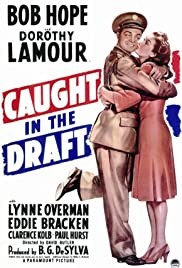
CAUGHT IN THE DRAFT
US, 1941, 81 minutes, Black and white.
Bob Hope, Dorothy Lamour, Lynn Overman, Eddie Bracken, Clarence Kolb.
Directed by David Butler.
Caught in the Draft has the atmosphere World War II about it, but it was made prior to the bombing of Pearl Harbor. Later it would have served as a comic contribution to morale boosting, life in the Army, service.
As it is, it is a star vehicle for Bob Hope at the beginning of his screen career, making several of the Road to films of the time, this one preceding Nothing but the Truth.
The plotline is obvious enough for Bob Hope comedy, his vanity, the cowardly streak, the lecherous touches and innuendo (at a PG rating level). He appears as a popular film star, encounters the daughter of a colonel, Dorothy Lamour, rather the opposite of her typical characters. He is attracted to her and, when the draft is announced, tries to avoid it by getting flat feet but decides to propose to her and marry her and so avoid the draft.
There are various complications, satire about the vain film star, his cowardly attitudes, his interaction with his loyal agent, Lynn Overman, and Bert, Eddie Bracken as his chauffeur.
In trying to organise avoiding the draft, he actually is drafted and there follows the expected army camp comedy routines, accidents with tanks, peeling hundred of potatoes, defying The colonel, wooing Tony. Usually Dorothy Lamour finishes up with Bing Crosby, especially in the Road films, but here, as in They Got Me Covered, she finishes up with Hope!
1. The film in the context of World War II? The war in Europe by 1941? But released four months before Pearl Harbor? American morale boosting?
2. Bob Hope comedy in his early years of screen comedies? His persona, vanity, cowardly, the touch of the PG lecherous? The reality of Bob Hope’s career in entertaining the troops in so many wars?
3. The war film, Bob Hope for half a minute as heroic? Then his collapse, hating gunfire, interrupting the filming? Don and his status as a movie star, popularity? His constant working with his agent, their repartee, loyalty, fixing things? His working with Bert, friendship, loyalty, driving, repartee?
4. Antoinette, coming to the studio, with her colonel father, Don’s infatuation, coming on to Tony, the make up man and the colonel? Tony and the explosion, Don falling into the mud?
5. Don, popular, autographs, womaniser? The news of the draft, the age limit? Scheming how to get out of the draft, wanting flat feet and jumping to the floor? The decision about marrying, before the official Senate passing of the law, looking at all the photos, the rejections? Choosing Tony? The dates, the outings, the discussions? Her realising the truth?
6. The scheme to get the actor to impersonate the recruiting officer? The real officer not having time off? Don arriving, going through the motions, persuading Tony, her accompanying him? His signing himself away? Realisation of the truth?
7. Tony, ups and downs with the relationship, her seeing through him, yet liking him? The hostility of her father?
8. The Army camp comedy, Don and his presumptions, his agent and chauffeur with him, awkward with the guns, with the timetable, the drills, his being photographed and the newsreels, the colonel and his hostility? The job and driving the tank, the comedy and awkwardness, the chauffeur and his picking up the girl, crashing into the colonel’s car? The transition to them peeling potatoes? So many potatoes?
9. His going to the house, letting off the colonel’s adjutant, with Tony in the bedroom, the colonel’s arrival?
10. Don going on duty, without his clothes, the plan to put them on, Bert and Margie and their help, the room, the nurses coming in to change, the clothes taken to the laundry, Margie rescuing them, hiding in the infirmary, the jokes with castor oil, the threats of the colonel, Tony intervening, getting back on time?
11. The final battle, sent out of harm’s way, Bert changing the roadsigns, Tony arriving, the Army going into the firing line, her riding the horse, Don on the horse, desperation, stopping the advance?
12. And the promotion for all three, the congratulations of the colonel, the wedding – and not having two dollars?
Published in Movie Reviews
Published in
Movie Reviews